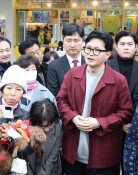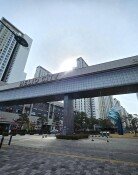[Editorial] Government Lies to Hide Obstruction of Freedom of the Press
[Editorial] Government Lies to Hide Obstruction of Freedom of the Press
Posted May. 24, 2007 03:34,
Ever since the government announced its plan to merge and abolish the press centers of government bodies, which would substantially limit fact-finding activities by journalists, the Government Information Agency has been busy defending it.
On the Internet site administered by the Government Information Agency, Gukjeong Briefing, it applauded itself, saying, The new system is the official announcement of the willingness of the government to open and expose itself to criticism where necessary. What he said misleads the people. At the core of this measure, on the contrary, is the intention of the government to prevent openness and criticism by frustrating the fact-finding activities of the press.
In an article tilted, Is the privilege of a press room the Peoples Right to Know? the Government Information Agency gives specific instructions on fact finding that if a journalist finds some questions unanswered by the briefing, he or she can call the official in charge of the policy concerned and ask questions. But in reality, when an important issue arises, journalists are prohibited to make visits just for finding facts, and the phone lines of the officials will be busy with dozens of journalists calling.
Participation by journalists in the Open Briefing System adopted in 2003 has been poor because the government has given insipid briefings, only giving out information it wanted or rehashing old issues. When journalists ask questions on sensitive issues, the government employees circumvent the questions citing a lack of time. Never has it kept its promise to expand the scope of open information.
The new measure explicitly exposes the intention to block access by journalists and to turn toward a more secretive administration. The expression that it is a worldwide custom is a flat lie as well. In the U.S., each government body runs a press center, and in Japan there are more than 800 press centers.
Kim Chang-ho, the chair of Government Information Agency, said that he collected the opinions of press associations and academics before coming up with the plan, but a head of a press association says, I met him once and expressed my concerns.
Now the Government Information Agency is making excuses, saying, The real intentions of the plan are to restore the healthy tension between the press and the government. President Roh Moo-hyun, after a short apology following his injurious words describing the journalists as sitting in the press room all day and colluding, pushed for the measure. The whole world knows that the presidents ungrounded words were what caused this new measure.
The peoples right to know and the freedom of press are realized only when a journalists freedom to find facts is protected. Kim, who asserts that the measure, which blocks all routes of fact-finding in the actual sense, does not really limit any right to know or the freedom to find facts, must have believed that the freedom of press is the basis of democracy when he worked for a press company in the past. As far as freedom of press is concerned, President Roh will be recorded as the worst president, and Kim his craven perpetrator.







